The world’s largest tropical wetland has become an inferno

A Jaguar named Ousado, who suffered second-degree burns during fires in the Pantanal region, rests in his cage at the headquarters of Nex Felinos, an NGO aimed at defending endangered wild cats, in the city of Corumba, Goias state, Brazil, on Sept. 27. (AP Photo/Eraldo Peres)
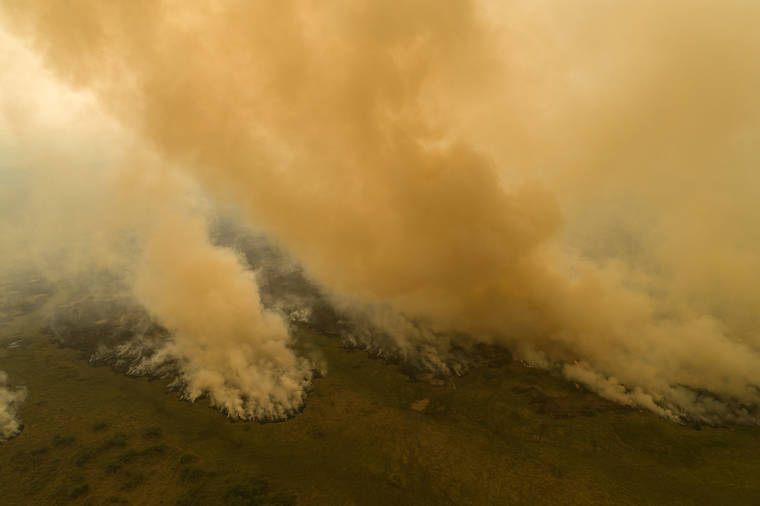
Fire consumes an area next to the Trans-Pantanal highway in the Pantanal wetlands near Pocone, Mato Grosso state, Brazil, Friday, Sept. 11, 2020. Diminished visibility from fires in the Pantanal and the neighboring Amazon forced President Jair Bolsonaro's plane to abandon a Sept. 18 landing attempt in the state of Mato Grosso. (AP Photo/Andre Penner)
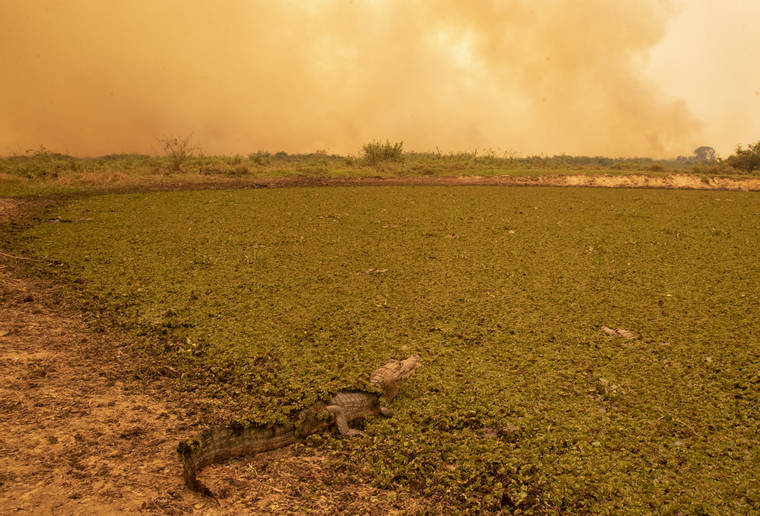
A caiman sits in a field of green as a fire consumes an area next to the Trans-Pantanal highway in the Pantanal wetlands near Pocone, Mato Grosso state, Brazil, Friday. (AP Photo/Andre Penner)
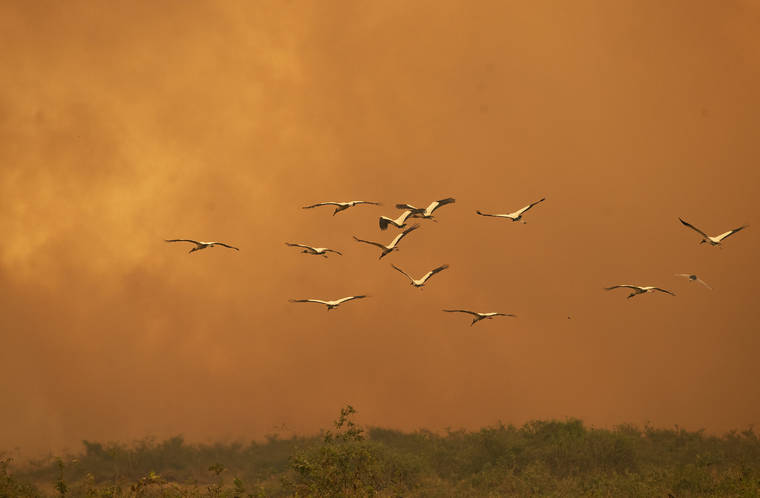
Birds fly past as a fire consumes an area next to the Trans-Pantanal highway in the Pantanal wetlands near Pocone, Mato Grosso state, Brazil, Friday, Sept. 11, 2020. As of Sept. 13, 19% of the Pantanal had been consumed by fire, according to a satellite laboratory at the Federal University of Rio de Janeiro. (AP Photo/Andre Penner)
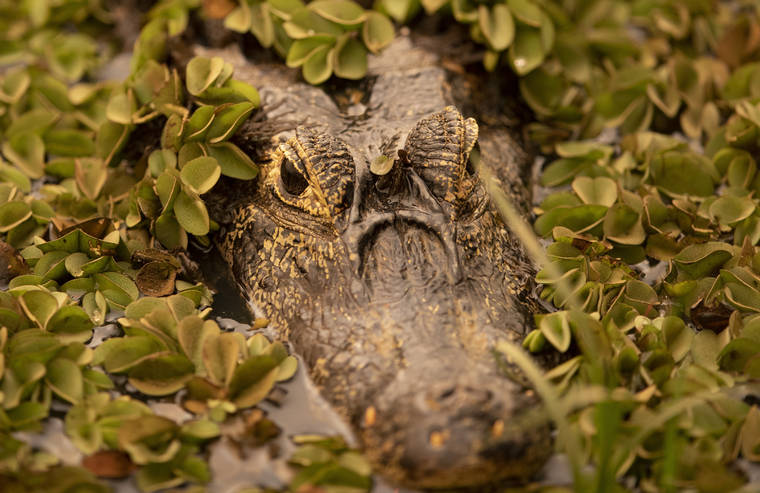
A caiman peeks out from a field of green as a fire consumes an area next to the Trans-Pantanal highway in the Pantanal wetlands near Pocone, Mato Grosso state, Brazil, Friday, Sept. 11, 2020. The Pantanal is the world’s largest tropical wetlands, popular for viewing jaguars, along with caiman, capybara and more. This year the Pantanal is exceptionally dry and burning at a record rate. (AP Photo/Andre Penner)
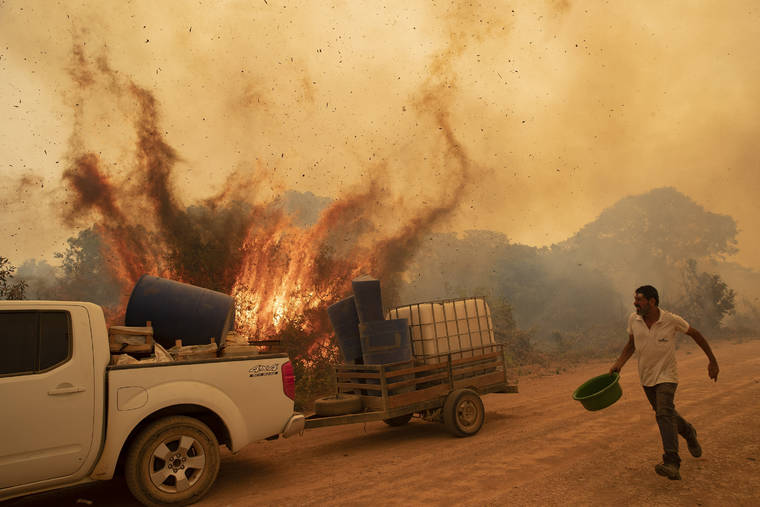
Volunteer Divino Humberto tries to douse the fire along a dirt road off the Trans-Pantanal highway, in the Pantanal wetlands near Pocone, Mato Grosso state, Brazil, on Sept. 11. Pouring the water had little effect as wind redirected the fire toward a tree, causing it to explode as though it had been soaked with gasoline. (AP Photo/Andre Penner)
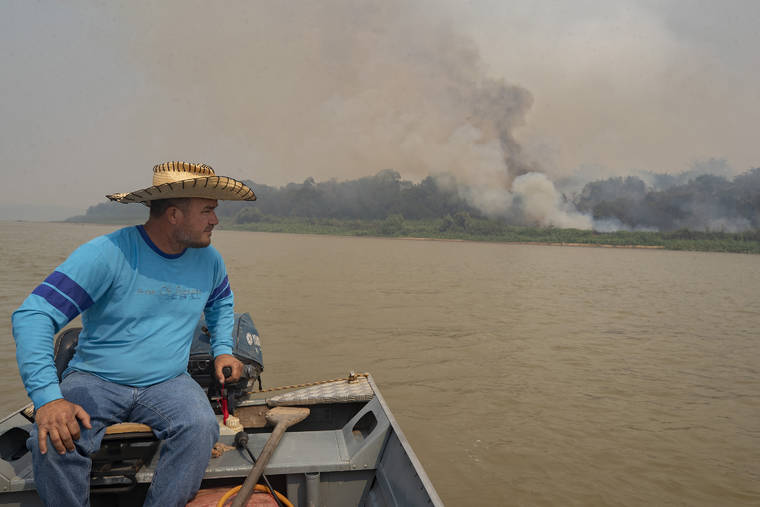
Daniel Moura, an eco-tourism guide, rides his boat on the Cuiaba river as fires burn in the Encontro das Aguas Park near Pocone, Mato Grosso state, Brazil, Saturday, Sept. 12, 2020. The Pantanal, the world’s largest tropical wetlands and a biodiversity hot spot, this year is exceptionally dry and burning at a record rate. (AP Photo/Andre Penner)
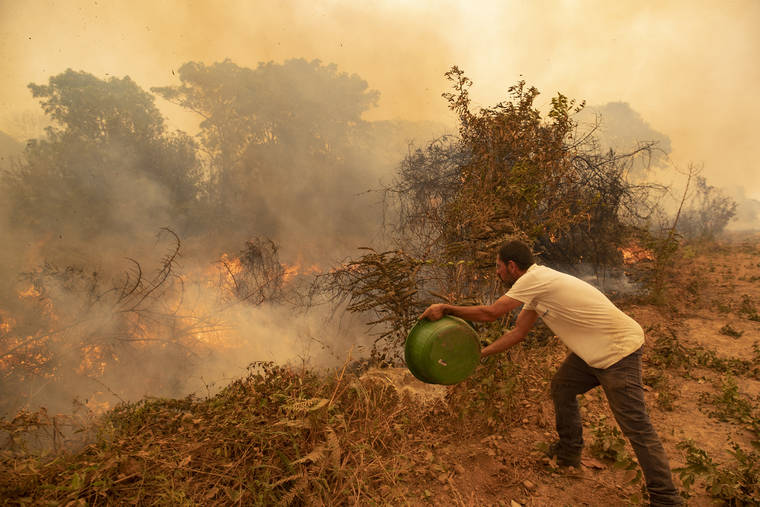
A volunteer tries to douse a fire on the Transpantaneira road in the Pantanal wetlands near Pocone, Mato Grosso state, Brazil, Friday, Sept. 11, 2020. The number of fires in Brazil’s Pantanal, the world’s biggest tropical wetlands, has more than doubled in the first half of 2020 compared to the same period last year, according to data released by a state institute. (AP Photo/Andre Penner)
This year, roughly a quarter of the vast Pantanal wetland in Brazil, one of the most biodiverse places on Earth, has burned in wildfires worsened by climate change. What happens to a rich and unique biome when so much is destroyed?
This year, roughly a quarter of the vast Pantanal wetland in Brazil, one of the most biodiverse places on Earth, has burned in wildfires worsened by climate change. What happens to a rich and unique biome when so much is destroyed?
The unprecedented fires in the wetland have attracted less attention than blazes in Australia, the western United States and the Amazon, its celebrity sibling to the north. But while the Pantanal is not a global household name, tourists in the know flock there because it is home to exceptionally high concentrations of breathtaking wildlife: jaguars, tapirs, endangered giant otters and bright blue hyacinth macaws. Like a vast tub, the wetland swells with water during the rainy season and empties out during the dry months. Fittingly, this rhythm has a name that evokes a beating heart: the flood pulse.
The wetland, which is larger than Greece and stretches over parts of Brazil, Paraguay and Bolivia, also offers unseen gifts to a vast swath of South America by regulating the water cycle upon which life depends. Its countless swamps, lagoons and tributaries purify water and help prevent floods and droughts. They also store untold amounts of carbon, helping to stabilize the climate.
For centuries, ranchers have used fire to clear fields and new land. But this year, drought worsened by climate change turned the wetlands into a tinderbox and the fires raged out of control.
“The extent of fires is staggering,” said Douglas C. Morton, who leads the Biospheric Sciences Laboratory at the NASA Goddard Space Flight Center and studies fire and food production in South America. “When you wipe out a quarter of a biome, you create all kinds of unprecedented circumstances.”
His analysis showed that at least 22% of the Pantanal in Brazil has burned since January, with the worst fires, in August and September, blazing for two months straight.
Naturally occurring fire plays a role in the Pantanal, in addition to the burning by ranchers. The flames are usually contained by the landscape’s mosaic of water. But this year’s drought sucked these natural barriers dry. The fires are far worse than any since satellite records began.
They are also worse than any in the memory of the Guató people, an Indigenous group whose ancestors have lived in the Pantanal for thousands of years.
Guató leaders in an Indigenous territory called Baía dos Guató said the fires spread from the ranches that surround their land, and satellite images confirm that the flames swept in from the outside. When fire started closing in on the home of Sandra Guató Silva, a community leader and healer, she fought to save it with the help of her son, grandson and a boat captain with a hose.
For many desperate hours, she said, they threw buckets of river water and sprayed the area around the house and its roof of thatched palm leaves. They succeeded in defending it, but at least 85% of her people’s territory burned, according to Instituto Centro de Vida, a nonprofit group that monitors land use in the area. Throughout the Pantanal, almost half of the Indigenous lands burned, an investigative journalism organization called Agência Pública found.
Now Guató Silva mourns the loss of nature itself. “It makes me sick,” she said. “The birds don’t sing anymore. I no longer hear the song of the Chaco chachalaca bird. Even the jaguar that once scared me is suffering. That hurts me. I suffer from depression because of this. Now there is a hollow silence. I feel as though our freedom has left us, has been taken from us with the nature that we have always protected.”
Scientists are scrambling to determine an estimate of animals killed in the fires. While large mammals and birds have died, many were able to run or fly away. It appears that reptiles, amphibians and small mammals have fared the worst. In places like California, small animals often take refuge underground during wildfires. But in the Pantanal, scientists say, fires burn underground too, fueled by dried-out wetland vegetation. One of the hard-hit places was a national park designated as a United Nations World Heritage site.
“I don’t want to be an alarmist,” said José Sabino, a biologist at the Anhanguera-Uniderp University in Brazil who studies the Pantanal, “but in a region where 25% has burned, there is a huge loss.”
Last week, the O Globo newspaper reported that firefighting specialists from Brazil’s main environmental protection agency were stymied by bureaucratic procedures, delaying their deployment by four months.
Given the scope of the fires, their long-term consequences on the Pantanal are unclear. The ecosystem’s grasslands may recover quickly, followed by its shrub lands and swamps over the next few years, said Wolfgang J. Junk, a scientist who specializes in the region. But the forests will require decades or centuries.
Even more critical than the impact of this year’s fires, scientists say, is what they tell us about the underlying health of the wetlands. Like a patient whose high fever signals a dangerous infection, the extent of the wildfires is a symptom of grave threats to the Pantanal, both from inside and out.
More than 90% of the Pantanal is privately owned. Ranchers have raised cattle there for hundreds of years, and ecologists emphasize that many do so sustainably. But new farmers are moving in, often with little understanding of how to use fire properly, said Cátia Nunes, a scientist from the Brazilian National Institute for Science and Technology in Wetlands. Moreover, cattle farming in the highlands has put pressure on local farmers to increase the size of their herds, using more land as they do so.
But perhaps the most ominous danger comes from even further afield: climate change. The effects that models have predicted, a much hotter Pantanal alternating between severe drought and extreme rainfall, are already being felt, scientists say. A study published this year found that climate change poses “a critical threat” to the ecosystem, damaging biodiversity and impairing its ability to help regulate water for the continent and carbon for the world. In less than 20 years, it found that the northern Pantanal may turn into a savanna or even an arid zone.
“We are digging our grave,” said Karl-Ludwig Schuchmann, an ecologist with Brazil’s National Institute of Science and Technology in Wetlands and one of the study’s authors.
To save the Pantanal, scientists offer solutions: Reduce climate change immediately. Practice sustainable agriculture in and around the wetland. Pay ranchers to preserve forests and other natural areas on their land. Increase ecotourism. Do not divert the Pantanal’s waters, because its flood pulse is its life.
“Everybody talks about, ‘we have to avoid this and that,’” Schuchmann said. “But little is done.”


